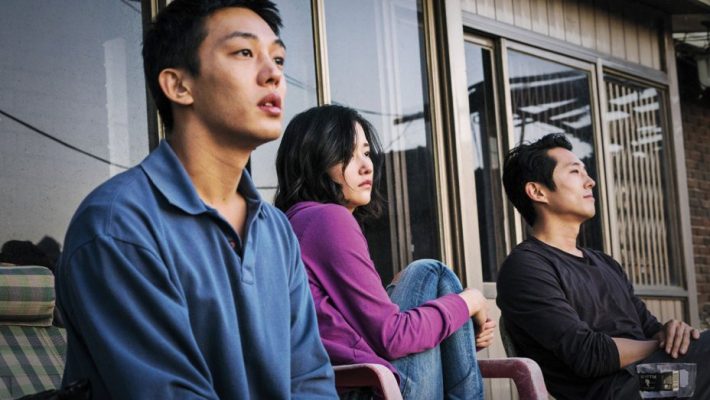@Filmhouse, Edinburgh from Fri 8 Feb 2019
When Jong-su (Ah-in Yoo), reconnects with childhood friend, Hae-mi (Jong-seo Jun), it seems like the beginning of a possible romance. A budding centre to his largely friendless and lonely existence. Only for her to return from a trip abroad with a rich and suave new beau, Ben (Steven Yeun), thrusting the awkward Jong-su into the difficult position of being a periphery figure in a larger world of rich friends, and social situations he barely understands and cannot navigate. All the while there resides a bubbling uncertainty to the motives behind Ben’s cool, detached affability, and his strange confession about his hobby of burning greenhouses.
Burning is based on a conceptual pairing of the two short stories, both named Barn Burning. One being the 1983 piece by Japanese author, Haruki Murakami, from which the film takes the basic story beats and mood. The other being William Faulkner‘s 1939 tale of class warfare, patriarchal anger, and rural poverty in late 19th Century America. Both play on anxieties surrounding social stratification, miscommunication, and difficulties in communication. The film however, substitutes the burning of barns, for that of greenhouses; a common real life occurrence in modern South Korea.
It’s a powerful literary combination, and the script by Chang-dong and Oh Jung-mi, wears it proudly on its sleeve. Namedropping not only Faulker, but also The Great Gatsby, from which it draws a clear parallel, it touches on the schisms between Korea’s classes, the rural farming folk and the wealthy elites. The relationship between Ben, Hae-mi and Jong-su is particularly clear in trying to evoke a hint of Fitzgerald‘s novel. Yet it’s only a single facet of this multi-layered and deeply engaging story, winding a complex psychological journey through the events that baffle and fascinate in equal measure.
Yoo in particular is the standout amongst the cast. He creates and embodies in Jong-su, an unconventional anti-hero; slovenly, awkward and socially anxious, with all the charm and grace of a slobbering dog. Even his gait is lumbering as he shambles around onscreen with an unfocused, gormless expression. Yeun’s portrayal of Ben, on the other hand, is a masterclass is easy grace and charm. Where Jong-su often resembles a pile of old laundry, Ben is constantly immaculate, both in dress and in speech. Indeed, it’s no accident that Hae-mi exists as a creature of both worlds; from humble roots but with high designs. She’s desired by both men, but truly respected by neither. Ironically the script treats her in much the same way, affording her little in the way of understanding, and viewed through the eyes of Jong-su and his narrow-minded selfish adoration.
It could be said that the film is let down by this somewhat dismissive portrayal of the lead female role, but in fact, it is rather the point. In fact, the only real downside to the experience was that the run-time is more than a little indulgent. When the end finally arrives, it’s after several moment of more natural conclusion. Indeed, the film would benefit from a judicious pruning of ten to fifteen minutes. That said, Burning is a stunningly intricate and fascinating film. An exploration of a variety of themes and ideas that will continue to smoulder in your mind long after it has finished.
